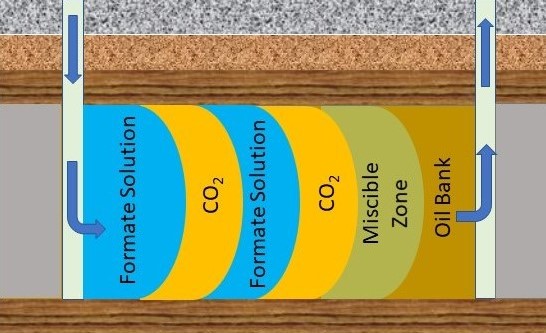
The State of Texas Advanced Resource Recovery
The State of Texas Advanced Resource Recovery (STARR) program works with energy operators in the state of Texas to increase the production and profitability of the state’s earth resources. To date the program has returned over $900 million to the state on an investment of $64 million. A current research focus is on emerging energy opportunities on Permanent University Funds lands, which support higher education in Texas.
Experts: Lorena Moscardelli, William Ambrose, Peter Flaig
STARR ProgramSalt Could Play Key Role in Energy Transition
A common ingredient – salt – could have a big role to play in the energy transition to lower carbon energy sources. That’s according to a new study led by researchers at The University of Texas at Austin’s Bureau of Economic Geology.
STARR Program Biennium Report to the Texas Legislature
The mission of the State of Texas Advanced Resource Recovery program is to conduct geoscience and engineering research to increase the production and profitability of earth resources, including oil, natural gas, hydrogen, geothermal and minerals, within the State of Texas.

Critical Minerals
Jackson School scientists are conducting research that can help find, extract and refine the critical minerals needed to power electric vehicles, cellphones, solar panels, wind turbines and other modern technology vital for the energy transition. Researchers are studying the feasibility of extracting these minerals from waste products, such as coal ash and produced water, developing new mining methods that help break up source rock and store carbon at the same time, and making advances in “conceptual exploration targeting,” a way to find mineral deposits based on the movements of chemical elements through a region over space and time.
Experts: Marek Locmelis, Brent Elliot, Esti Ukar

Energy and Earth Resources Graduate Program
Founded in 1981, the Energy and Earth Resources master’s program prepares students for business, finance, planning and management careers in the energy sector. While based in the Jackson School, students learn from faculty members from across UT Austin, including the Cockrell School of Engineering, LBJ School of Public Affairs, College of Liberal Arts and School of Law. You can find EER alumni in a range of energy jobs, including oil and gas, electric vehicles, and battery storage.
Program Director: Fred Beach
EER Program Pick Your Path
Not long ago, a career in energy was practically synonymous with a career in fossil fuels. But according to Richard Chuchla, who spent more than 35 years at ExxonMobil before joining the Jackson...

Oil and Gas
Generations of oil and gas professionals got their start at the Jackson School. The school continues its legacy of hydrocarbon education and research today, with comprehensive studies of the Permian Basin and other major oil and gas plays. The school is a leader in research on methane hydrate, a frozen form of natural gas and potential future fuel. Together, the school’s research consortia cover all major aspects of subsurface reservoirs, including deposition, porosity and pressure.
Experts: Mark Shuster, Peter Flemings
BEG Energy
Carbon Capture and Storage
For more than 20 years, the Gulf Coast Carbon Center has been advancing science of subsurface carbon storage with an emphasis on understanding carbon storage opportunities in the Gulf of Mexico. It was recently selected to lead a U.S. Department of Energy effort to jump-start the carbon capture economy in the region. Researchers at the center lead surveys, conduct small and large-scale experiments, and advise on carbon storage policy at the state, national and global scales, including United Nations COP conferences on combating climate change.
Experts: Susan Hovorka, Tip Meckel, Katherine Romanak, Seyyed Hosseini, Alex Bump
Gulf Coast Carbon CenterNew Program Helps Texas Schools Teach Carbon Capture
When Cynthia Hopkins returned to her 7th grade science classroom in Corpus Christi this fall she had a little something extra in her toolkit — ready-made lesson plans and materials to teach her students about...

Geothermal
The “geothermal anywhere” research paradigm seeks to expand geothermal energy to a host of new places by using technology that can capture heat at shallower depths than conventional methods. The HotRock Geothermal Research Consortium is working with industry to advance the technology needed to capture this heat and to find geothermal hots spots. The consortium is currently studying the feasibility of closed-loop geothermal energy systems on military bases, and has found a new significant source of geothermal energy in Presidio County.
Experts: Ken Wisian, Shuvajit Bhattacharya
HotRockThe Future of Geothermal in Texas
After a year-long multi-disciplinary, cross-collaborative effort, researchers at five Texas universities, the University Lands Office, and the International Energy Agency published “The Future of Geothermal in Texas...
Geothermal Energy Revolution in Presidio County?
New-paradigm geothermal is booming, interest and investment are intense, and projects are progressing at an increasing pace. Currently there are many independent vectors of work, led mainly by...

Induced Seismicity
Jackson School scientists at the Center for Injection and Seismicity Research (CISR) are studying the impacts of large-scale injection of water produced by the oil and gas industry on the subsurface and surface environment and offering potential solutions for mitigating related earthquake hazards. Scientists are also tracking and sharing data on seismicity in Texas with the TexNET seismic network, which monitors seismic activity across the state with a network of more than 200 stations.
Experts: Katie Smye, Alexandros Savvaidis, Peter Hennings
Earthquakes Are Moving Northeast in Midland Basin of Texas
After analyzing seven years of earthquake data from the Midland Basin, a team of scientists at The University of Texas at Austin has found that seismic activity is probably on the move northeast toward the community of Big Spring...

Core Research Centers
Core samples and cuttings provide unparalleled insight into geologic environments and energy production potential of different regions. Two research centers at the Jackson School maintain a world-class collection of contemporary and historical geologic samples from wells drilled throughout Texas, the U.S., and the world: The Austin Core Research Center and the Houston Core Research Center. The Austin center is the main core repository for core and rock material donated to UT Austin. It holds more than 700,000 boxes of core and cuttings – including cuttings that led to the Eagle Ford shale boom. The cuttings were brought to the surface in 1952 but were not closely examined until 2008, when geologist Gregg Robertson tracked them down to ground-truth drilling plans.
Austin Core Research Center facility manger: Nathan Ivicic
Core and Research FacilitiesInside the Collections
Specimens that span Earth’s history combine wonder with scientific worth. Impressive specimens abound in the collections of the Jackson School of Geosciences.There’s the Texas Pterosaur, Quetzalcoatlus...

Hydrogen
From sourcing, to storage, to transport, developing a hydrogen economy at scale is a multifaceted issue. Researchers at the GeoH2 Industrial Affiliates Program are studying it all to advance a new hydrogen energy sector. Researchers are also studying naturally occurring sources of hydrogen, in-situ hydrogen generation in oil reservoirs, and how “geologic hydrogen” could be generated from ultramafic rocks and specialized catalysts — a method that produces no carbon emissions.
Experts: Mark Shuster, Lorena Moscardelli, Toti Larson
Hydrogen ResearchGeoH2
GeoH2, an industrial affiliates program (IAP), conducts geoscience, engineering, and economic research to facilitate and advance the development of a hydrogen economy at scale...

Policy and Economics
Where energy comes from and how it is produced has costs, both economic and environmental. The Comparing Electricity Options (CEO) research project is studying these costs for solar, wind and gas for the global supply chain. The Bureau of Economic Geology is conducting market research on hydrocarbons, the energy transition and water access, among other energy and environmental topics. And as a member of the UT Kay Bailey Hutchison Energy Center, Jackson School faculty members are contributing to dialogue on energy issues at the intersection of business, law, policy, engineering and geosciences.
Experts: Ning Lin, Michael Young
Economic ResearchThe Real Cost of Electricity
Unravelling the hidden costs and environmental impacts of producing electricity — option by option. The goal of the energy transition is simple: lower emissions and still provide enough energy for society to grow and prosper...






